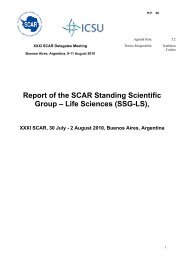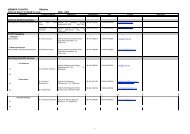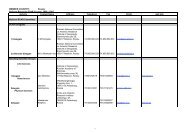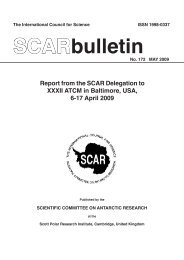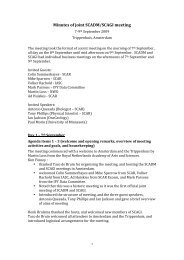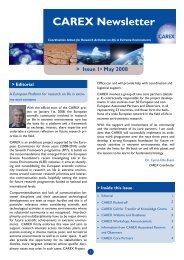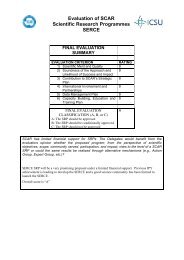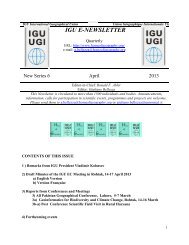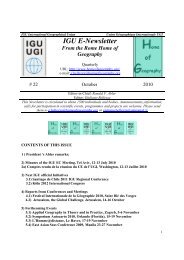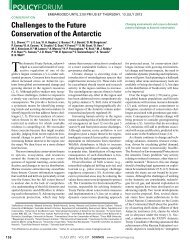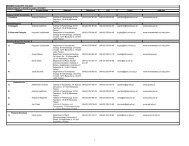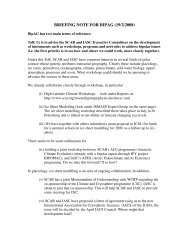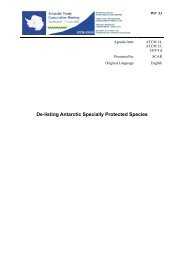SCAR Strategic Plan - Scientific Committee on Antarctic Research
SCAR Strategic Plan - Scientific Committee on Antarctic Research
SCAR Strategic Plan - Scientific Committee on Antarctic Research
You also want an ePaper? Increase the reach of your titles
YUMPU automatically turns print PDFs into web optimized ePapers that Google loves.
SCIENTIFIC COMMITTEE ON ANTARCTIC RESEARCH<br />
Data Centres.<br />
The <str<strong>on</strong>g>SCAR</str<strong>on</strong>g>-COMNAP Joint <str<strong>on</strong>g>Committee</str<strong>on</strong>g> <strong>on</strong> <strong>Antarctic</strong><br />
Data Management (JCADM) advises <str<strong>on</strong>g>SCAR</str<strong>on</strong>g> and COMNAP<br />
<strong>on</strong> all aspects of <strong>Antarctic</strong> data matters. JCADMʼs activities<br />
are overseen by the Steering <str<strong>on</strong>g>Committee</str<strong>on</strong>g> for <strong>Antarctic</strong> Data<br />
Management (STADM). JCADM comprises the managers<br />
of each Nati<strong>on</strong>al <strong>Antarctic</strong> Data Centre (NADC), or<br />
relevant nati<strong>on</strong>al c<strong>on</strong>tacts if a NADC has not yet been<br />
established. It enlists NADCs and helps them document<br />
their nati<strong>on</strong>al <strong>Antarctic</strong> datasets through the creati<strong>on</strong> and<br />
use of index (metadata) records. The result is the <strong>Antarctic</strong><br />
Master Directory (AMD), which is part of the Global<br />
Change Master Directory (GCMD), and thus provides a<br />
link to global datasets. Data within some NADCs is made<br />
available through new Internet Web service initiatives,<br />
such as the Global Biodiversity Informati<strong>on</strong> Facility.<br />
Together the AMD and the NADCs comprise the<br />
<strong>Antarctic</strong> Data Directory System (ADDS), development of<br />
which is coordinated by JCADM. The ADDS is intended<br />
to provide an index for access to all <strong>Antarctic</strong> data, no<br />
matter where or how they are stored. The beneficiaries of<br />
the System are <str<strong>on</strong>g>SCAR</str<strong>on</strong>g> and COMNAP members, the broader<br />
research community, and the public.<br />
Aside from storage in NADCs, some, but not all,<br />
<strong>Antarctic</strong> data are stored in ICSUʼs World Data Centres<br />
(WDCs). Other data may be stored in Nati<strong>on</strong>al Ocean Data<br />
Centres (NODCs) coordinated by the IOCʼs Internati<strong>on</strong>al<br />
Ocean Data and Informati<strong>on</strong> Exchange Programme<br />
(IODE), or in the Nati<strong>on</strong>al Meteorological Data Centres<br />
coordinated by the World Meteorological Organisati<strong>on</strong><br />
(WMO). <str<strong>on</strong>g>SCAR</str<strong>on</strong>g> needs a mechanism to ensure that<br />
c<strong>on</strong>necti<strong>on</strong>s can be made easily to and between these<br />
different databases.<br />
The ATCM itself has acknowledged<br />
i. that it is difficult to get investigators to provide<br />
data to NADCs;<br />
ii. that some Treaty Parties have not nominated<br />
NADCs; and<br />
iii. that data are not being managed by all so that free<br />
access is enabled.<br />
For that reas<strong>on</strong>, ATCM Resoluti<strong>on</strong> 4 (1998)<br />
recommended that:<br />
• Parties who have not yet d<strong>on</strong>e so should establish<br />
Nati<strong>on</strong>al <strong>Antarctic</strong> Data Centres and link them to<br />
the ADDS;<br />
• Parties and their NADCs encourage their scientists,<br />
through a process of educati<strong>on</strong>, support and the<br />
development of policies and procedures, to provide<br />
in a timely manner appropriate informati<strong>on</strong> to their<br />
NADCs for distributi<strong>on</strong> through the ADDS; and<br />
• Parties give priority c<strong>on</strong>siderati<strong>on</strong> as to how the<br />
requirement for freedom of access to scientific<br />
informati<strong>on</strong>, in accordance with Article III (1)(c)<br />
of the Treaty, is achieved within their nati<strong>on</strong>al data<br />
management systems.<br />
<str<strong>on</strong>g>SCAR</str<strong>on</strong>g> will urge Members to fully implementati<strong>on</strong><br />
and support the <strong>Antarctic</strong> Data Directory System, which is<br />
essential to maximize the value of the data being collected<br />
in <strong>Antarctic</strong>a, and to report <strong>on</strong> progress at biennial <str<strong>on</strong>g>SCAR</str<strong>on</strong>g><br />
meetings.<br />
Recognising that geographic locati<strong>on</strong> is vital to<br />
integrating and communicating <strong>Antarctic</strong> science data<br />
and informati<strong>on</strong>, <str<strong>on</strong>g>SCAR</str<strong>on</strong>g> should include in its data and<br />
informati<strong>on</strong> management strategy c<strong>on</strong>siderati<strong>on</strong> of the<br />
role of Geospatial Informati<strong>on</strong>. To improve its use of<br />
geospatial informati<strong>on</strong>, <str<strong>on</strong>g>SCAR</str<strong>on</strong>g> aims to encourage the<br />
establishment of an <strong>Antarctic</strong> Spatial Data Infrastructure<br />
(ANTSDI) including fundamental geographic informati<strong>on</strong><br />
products and related policies, specificati<strong>on</strong>s and enabling<br />
technologies. The ANTSDI is the main goal of the <str<strong>on</strong>g>SCAR</str<strong>on</strong>g><br />
Expert Group <strong>on</strong> Geographical Informati<strong>on</strong>, which<br />
is another key element in the management and use of<br />
<strong>Antarctic</strong> data and informati<strong>on</strong>. Full implementati<strong>on</strong> of<br />
and support for the <strong>Antarctic</strong> Spatial Data Infrastructure<br />
will be essential to ensure the spatial integrity of data<br />
collected and to be able to make use of the power of<br />
geographic locati<strong>on</strong> in data discovery and retrieval, data<br />
mining, and data analysis.<br />
Generic advice <strong>on</strong> data and informati<strong>on</strong> management<br />
that <str<strong>on</strong>g>SCAR</str<strong>on</strong>g> should c<strong>on</strong>sider in developing its data and<br />
informati<strong>on</strong> management strategy is available from several<br />
sources, including a recent report by ICSUʼs Priority Area<br />
Assessment <strong>on</strong> <str<strong>on</strong>g>Scientific</str<strong>on</strong>g> Data and Informati<strong>on</strong>, which is<br />
available from the ICSU web site (http://www.icsu.org/).<br />
Data quality will be <strong>on</strong>e of the key issues to be addressed<br />
in developing the <str<strong>on</strong>g>SCAR</str<strong>on</strong>g> strategy <strong>on</strong> data and informati<strong>on</strong><br />
management.<br />
As part of the development of its data and informati<strong>on</strong><br />
management strategy <str<strong>on</strong>g>SCAR</str<strong>on</strong>g> should commissi<strong>on</strong>, with<br />
COMNAP, an external review of JCADM by data and<br />
informati<strong>on</strong> management experts. Particular attenti<strong>on</strong><br />
should be paid, am<strong>on</strong>g other things, to the ways in which<br />
JCADM makes its capabilities and products known to the<br />
community, the extent to which its products ands services<br />
meet the needs of that community, and its interacti<strong>on</strong>s<br />
with the Expert Group <strong>on</strong> Geographical/Geospatial<br />
Informati<strong>on</strong>. <str<strong>on</strong>g>SCAR</str<strong>on</strong>g> should also require the Expert Group<br />
<strong>on</strong> Geographical Informati<strong>on</strong> (EGGI) to liaise closely<br />
with the potential users of its products, and particularly<br />
with COMNAP, to ensure that maximum us is made of<br />
its products and that those products are adapted to fully<br />
meet user requirements.<br />
To ensure that data and informati<strong>on</strong> management are<br />
c<strong>on</strong>sidered at the highest level, a Vice President will carry<br />
resp<strong>on</strong>sibility for the data and informati<strong>on</strong> management<br />
portfolio.<br />
<str<strong>on</strong>g>SCAR</str<strong>on</strong>g> plays an important role in providing access to<br />
key databases, most of which are listed in Annex 7.<br />
<str<strong>on</strong>g>SCAR</str<strong>on</strong>g> Delegates have made several recommendati<strong>on</strong>s<br />
about the need for particular improvements in the<br />
collecti<strong>on</strong> and exchange of certain kinds of data or<br />
informati<strong>on</strong>, especially:<br />
• meteorological data (XXV1-4; XXVII-12; XXVII-<br />
13; XXVII-15; XXVIII-16 and 19),<br />
14



